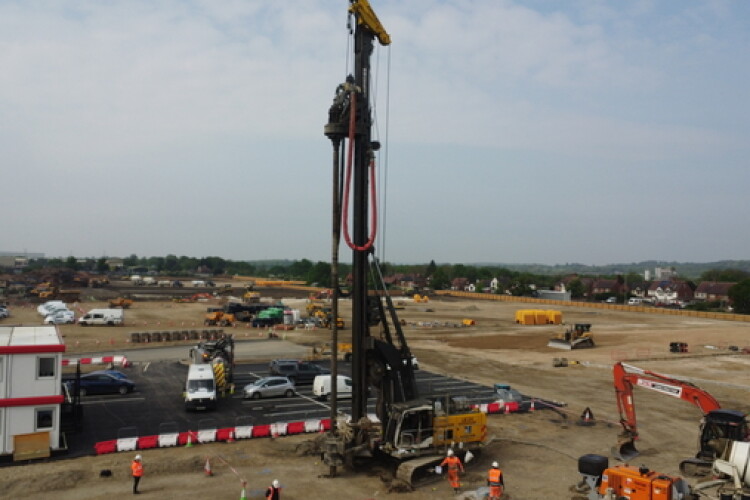St Modwen Park, Burton is a new 64-acre commercial business park strategically located adjacent to the A38 at the entrance to Burton-upon-Trent. Helping to bolster the East Midlands’ already strong position for logistics and distribution, the site has been in development since 2015 with staged phases rolled out over the past decade.
Aarsleff have been heavily involved with St Modwen Park, Burton throughout its development. We installed 1281 driven precast concrete piles in 2019 to found the third phase of development and 2612 driven precast concrete piles in 2023 for the first part of phase four.
Therefore, when we were approached by Winvic Construction to begin discussions on Units B79, B58 and B41 at St Modwen Park, Burton Phase 4 and 5, we were equipped with a wealth of experience in the area and a good understanding of the ground conditions.
Two solutions were proposed, a driven precast concrete pile solution similar to what we had installed previously, and a ground improvement package via the installation of rigid inclusions.
The latter proposed nominal 300mm diameter rigid inclusions installed on a designed grid layout to suit the ground bearing slab specification loadings, delivering ground improvement to meet the project performance specifications, as well as rigid inclusions for the structure pad foundations.
The two solutions were as follows:
|
Column Number |
Concrete Class |
Concrete (m3) |
Steel Reinforcement (t) |
|
|
Driven Precast |
2513 |
CEM1 C50/60 (35% PFA replacement) |
957 |
85.56 |
|
Rigid Inclusions |
3453 |
CIIIA+SR C12/15 (45% GGBS replacement) |
1847 |
n/a |
The rigid inclusion solution was chosen and 3453 were installed across the 3 units to depths of up to 9.0m through made ground and PFA fill material to found within the natural mudstone strata. One of the benefits of rigid inclusions is fast production. Over 100 can be installed per day with follow on works to trim and reinstate the load transfer platform also occurring during the same works shift. The inclusions were installed using AGE high torque Liebherr piling rigs and custom made displacement tools from Aarsleff’s own plant and fabrication workshop.
The tooling was designed following testing of an off-the-shelf solution which kept experiencing concrete blockages, disrupting production. So, the plant team set out to design and manufacture a series of displacement tools to suit our site feedback and specification with the result being a more efficient drilling time and less issues with blockages all aiding those daily production totals.
Throughout installation, the inclusion columns were tested via plate loading tests (PBT) to confirm the design requirements and ensure consistency with the model generated via Plaxis, coordinated by Aarsleff’s in house design engineers. In addition a series of dummy footing tests were also undertaken on each separate unit to confirm overall system performance.
Close control was also maintained over the depth of PFA fill during site works and that target installation depths met the founding strata requirements feeding back into the design assumptions to ensure grid spacings were appropriate for the ground conditions encountered. Alongside this, concrete cube testing was undertaken to confirm concrete strength requirements were met in line with specification with a full validation report issued on completion.
For more information visit Aarsleff Ground Engineering This article was paid for by Aarsleff Ground Engineering.
Got a story? Email news@theconstructionindex.co.uk



